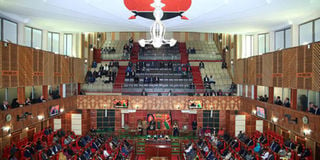Breaking News: At least 10 feared to have drowned in Makueni river
Parliament must protect independence

President Kenyatta addresses MPs during the official opening of the 12th Parliament on September 12, 2017. A choice between the Executive’s wishes and what is good for Wanjiku should be an easy one and MPs must be united by the plight of the citizen and the national good. PHOTO | FILE | NATION MEDIA GROUP
What you need to know:
- The debacle once again brought into sharp focus the independence of Parliament and its relationship with the Executive.
- The manner in which the Executive marshalled Parliament to pass the law portrays the image of a House firmly under the grip of the former.
- Patronage has been a recurring theme of the 12th Parliament’s relationship with the Executive.
A fortnight ago we were treated to a comedy of sorts in the National Assembly when Narok Woman Representative Soipan Tuya, either suffering from a hearing defect or oblivious to the reality before her, had most of us questioning our sanity after she called the vote for the “ayes” when it was obvious that the “nays” were louder.
The debacle once again brought into sharp focus the independence of Parliament and its relationship with the Executive.
For a moment, during the acrimonious process, it appeared as if the MPs had, for once, found their voice and were determined to overturn the President’s memorandum.
EXECUTIVE GRIP
But the manner in which the Executive marshalled — or, more accurately, bulldozed — Parliament to pass the law portrays the image of a House firmly under the grip of the former.
From summoning MPs to State House to close supervision by Jubilee Party’s top leadership in Parliament and a well-coordinated walkout led by the majority and minority leaders, the Executive was determined to have its way.
Since 2013, Jubilee has enjoyed a majority in the bicameral Parliament and has never shied away from flexing its muscles and exploiting the ‘tyranny of numbers’ to push through its agenda.
After last year’s elections, it ended up with a near-supermajority in both the National Assembly and the Senate, making the President to brag that his party had the numbers to change the Constitution.
Patronage has been a recurring theme of the 12th Parliament’s relationship with the Executive.
The House’s top leadership, and committee chairpersons, were all handpicked by the Executive and, while there is nothing wrong with that, merit — qualifications, suitability and experience — seem not to have been primary considerations.
MET WITH THREATS
Attempts to go against party position have been met with threats of de-whipping and expulsion — and that card was at play last week.
In a democracy, the people are paramount. Article 1 of our Constitution affirms that “All sovereign power belongs to the people of Kenya”, which is then delegated to the three arms of government. It is, therefore, the duty of the Executive, Legislature and Judiciary to perform their duties meaningfully and in the best interests of ‘Wanjiku’.
Article 95 empowers Parliament to represent the people, provide oversight and legislate. It specifically tasks the National Assembly to “deliberate on and resolve issues of concern to the people” and “review the conduct in office” of the Executive and “exercise oversight of State organs”.
But in total dereliction of duty and abdication of its constitutional role, Parliament has gleefully rubber-stamped every decision of the Executive.
When the President nominated his Cabinet, there were questions around some of the nominees’ qualifications and integrity, and the violation of the two-thirds gender threshold, but Parliament approved them.
QUESTIONABLE PAST
Again, when he nominated some individuals with a questionable past to ambassadorial positions without indicating their duty stations, MPs proceeded to vet and approve the appointments in record time.
In contrast, the incoming American ambassador, Senator Kyle McCarter, is yet to take up the post owing to a rigorous confirmation by the United States Senate’s Foreign Relations Committee.
The events that transpired in the House recently have also cast the spotlight on the much-heralded “handshake” and the role of the new-look Opposition. While initially viewed positively, as helping to calm political tensions, we witnessed first-hand what would happen if the major political sides closed ranks to force through unpopular laws detrimental to citizens.
INDEPENDENT
In opting for a presidential system, Kenyans wanted an Executive and Legislature that are separate and independent of each other and a Judiciary that was non-partisan enough to fairly interpret the Constitution and laws and take corrective action when one of the other arms fails to respect or protect citizens’ rights.
This is meant to prevent concentration of power in one organ and provide checks and balances while ensuring interdependence.
The recent events are a clear demonstration of the dangers of one arm of government wielding too much power over the others. Parliament must stop acting as an appendage of the Executive. It must find its voice against an overbearing Executive and jealously guard its independence from its onslaught.
A choice between the Executive’s wishes and what is good for Wanjiku should be an easy one and MPs must be united by the plight of the citizen and the national good.
Dr Kamau, a political communications specialist, teaches at the Graduate School of Media and Communications, The Aga Khan University.
[email protected]. Twitter: @thesamkamau




